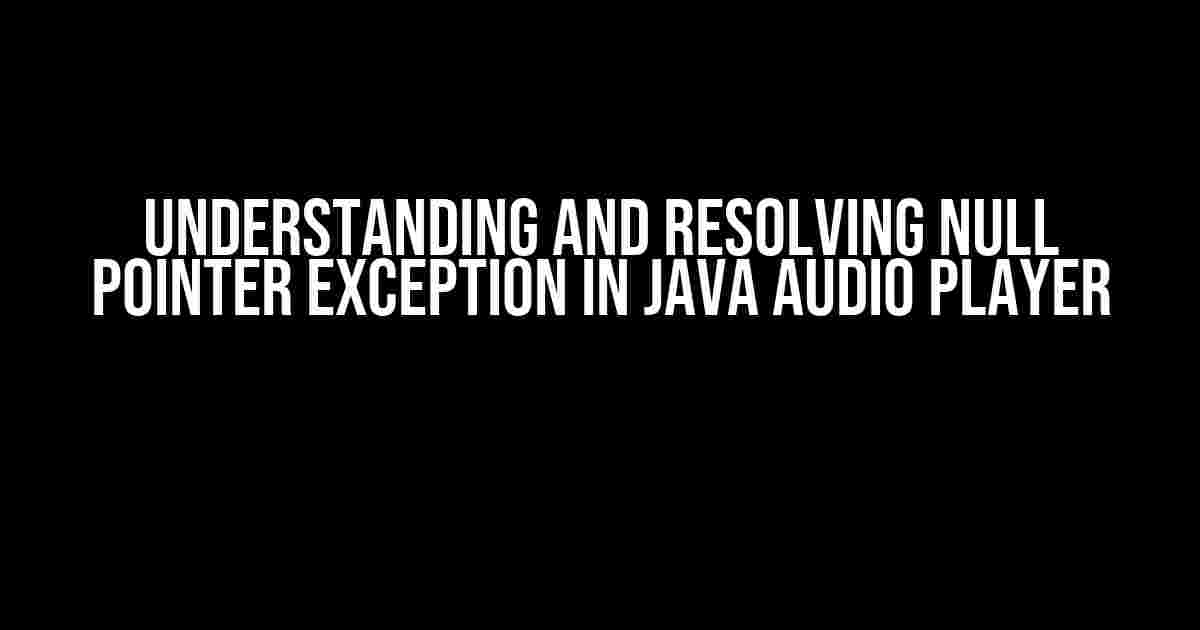A Null Pointer Exception in a Java audio player can be a frustrating issue that hinders the playback of audio files. This exception occurs when a Java program attempts to access or manipulate a null (non-existent) object reference. In this article, we will delve into the causes and solutions of the Null Pointer Exception in a Java audio player.
Cause of Null Pointer Exception in Java Audio Player
The primary cause of a Null Pointer Exception in a Java audio player is the absence of a valid object reference. This can occur due to various reasons, including:
- Uninitialized variables or objects
- Incorrectly allocated memory
- Incorrect object creation or initialization
- Failing to check for null values before accessing an object
Examples of Null Pointer Exception in Java Audio Player
Here are some common scenarios that can lead to a Null Pointer Exception in a Java audio player:
-
Uninitialized Audio Object
When creating an audio object, if the object is not properly initialized, it can lead to a Null Pointer Exception. For instance:
AudioPlayer player = null; player.playAudio("audiofile.mp3"); -
Failing to Check for Null Values
When retrieving audio data from a database or file, if the data is null, and you attempt to access it without checking for null values, it can result in a Null Pointer Exception. For example:
AudioData data = getDataFromDatabase(); data.parseAudioData();
Resolving Null Pointer Exception in Java Audio Player
To resolve a Null Pointer Exception in a Java audio player, follow these best practices:
- Properly initialize objects and variables before using them
- Use null checks to ensure the object reference is valid before accessing it
- Use try-catch blocks to handle and log exceptions
- Verify the correctness of audio data before processing it
Conclusion
A Null Pointer Exception in a Java audio player can be resolved by understanding the causes and taking preventative measures. By following best practices, such as proper object initialization, null checks, and exception handling, you can ensure a smooth and error-free audio playback experience. Remember to always check for null values and handle exceptions graciously to provide a robust Java audio player.
Frequently Asked Question
Get the beat back on track with answers to your Java audio player’s null pointer exception woes!
What is a null pointer exception in Java audio player, and why does it happen?
A null pointer exception occurs when your Java audio player tries to access an object that has a null value. This can happen when you’re trying to play a file that doesn’t exist, or when there’s an issue with the audio file’s metadata. Think of it like trying to play a song on a broken CD player – it just won’t work!
How do I identify the source of the null pointer exception in my Java audio player?
To identify the source of the null pointer exception, you’ll need to debug your code and look for any lines where you’re trying to access an object that might be null. Check your code for any variables that are initialized as null, and make sure you’re handling any possible null values. Think of it like tracing the beat of your code to find where it goes off the rails!
Can I fix the null pointer exception by simply checking for null values?
Yes, checking for null values is a good starting point! You can use if-else statements or try-catch blocks to handle null values and prevent the null pointer exception. However, it’s also important to fix the underlying issue that’s causing the null value in the first place. Think of it like fixing the broken CD player instead of just using a different CD!
Are there any best practices to avoid null pointer exceptions in Java audio players?
Yes, there are several best practices to avoid null pointer exceptions! Some of these include initializing objects properly, using design patterns like the null object pattern, and using Java’s built-in null safety features like Optional. Think of it like following a recipe to create the perfect soundtrack – you gotta have the right ingredients and techniques!
What are some common pitfalls to avoid when handling null pointer exceptions in Java audio players?
Some common pitfalls to avoid include ignoring null values, using magic numbers, and not testing your code thoroughly. You should also avoid using empty strings or arrays as placeholders, and make sure to close any resources you’re using. Think of it like avoiding the wrong notes in your music – it’s all about harmony and balance!
